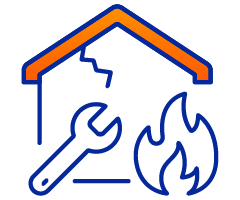Start Here
Homepage Bottom Form
We will get back to you as soon as possible.
Please try again later.
How to Negotiate with Your Insurance Company After a House Fire
🔥 How to Negotiate with Your Insurance Company After a Fire
After a fire, dealing with your insurance company can feel overwhelming — especially when you’re trying to rebuild your life and home.
This
negotiation guide helps homeowners and property owners understand their rights, avoid common pitfalls, and secure the
full and fair settlement they deserve.
🏠 1. Prepare Before You Negotiate
Preparation is your greatest advantage.
- Read your entire policy — know your coverage limits, exclusions, and deductibles.
- Gather every piece of documentation (photos, receipts, estimates, reports).
- Make a detailed home inventory with prices and item conditions.
- Understand your coverage types — Actual Cash Value (ACV) vs. Replacement Cost Value (RCV).
- Keep a claim log of every phone call, email, and meeting.
- Use official templates from House Fire Solutions (Expense Tracker, Inventory List, Claim Log).
- Organize all paperwork in a digital folder — easy access equals faster responses.
- Stay calm, polite, and factual — emotion can hurt negotiations.
🧾 2. Understand What You’re Owed
Knowing what’s covered keeps you from settling for less.
- Review Dwelling Coverage (A): the structure of your home.
- Review Other Structures (B): sheds, fences, garages, decks.
- Review Personal Property (C): everything you own inside the home.
- Review Additional Living Expenses (D): hotels, meals, rentals.
- Ask your insurer for a complete breakdown of all limits.
- Understand that depreciation isn’t always final — you can recover it later under RCV policies.
- Compare your adjuster’s numbers to local market pricing — not just insurance software estimates.
📸 3. Document Every Loss Thoroughly
Your best negotiation tool is proof.
- Take clear, time-stamped photos of every room and item.
- Keep damaged items until inspected or approved for disposal.
- Label all photos by room (Living Room, Kitchen, etc.).
- Create a spreadsheet inventory listing brand, model, and value.
- Attach receipts or credit card statements for big-ticket items.
- Store files safely (cloud storage + external drive).
- Don’t rely on your adjuster’s notes — keep your own.
💬 4. Communicate Like a Pro
Insurance adjusters respect organization and persistence.
- Always communicate in writing (email preferred).
- Confirm every conversation with a written summary.
- Keep messages factual and professional — avoid emotional language.
- When calling, note date, time, and representative name.
- If you don’t understand something, ask: “Can you explain that in writing?”
- Avoid verbal agreements — always ask for email confirmation.
- Use your House Fire Solutions Communication Log Template to stay organized.
💵 5. Get Multiple Repair Estimates
Never rely on just one number.
- Get at least three written estimates from licensed contractors.
- Make sure estimates include materials, labor, permits, and taxes.
- Compare contractor quotes to your adjuster’s estimate.
- If numbers vary, ask your adjuster:
“Can you show me how your estimate accounts for all required repairs?”
- Include photos, blueprints, or damage reports to justify costs.
- Independent estimates help you prove true rebuild value — not what’s easiest for the insurer.
🧰 6. Challenge Low or Missing Estimates
Be respectful — but firm.
- Review your adjuster’s scope of loss line by line.
- Highlight anything missing, underpriced, or unclear.
- Ask your contractor to review the insurer’s estimate.
- Document each discrepancy with evidence or local pricing.
- Ask:
“Can you explain why this item was depreciated or excluded?”
- Request a re-inspection if major issues were overlooked.
- Don’t accept a settlement until every area of damage is listed.
🧯 7. Know Your Rights
Insurance companies have legal obligations — and you have leverage.
- You have the right to choose your own contractor.
- You have the right to fair and prompt payment.
- You have the right to appeal or dispute a settlement.
- You can request an independent appraisal if you disagree with the insurer’s valuation.
- You can hire a public adjuster or attorney to negotiate on your behalf.
- In most states, insurers must acknowledge and respond to claims within specific deadlines.
- If you suspect bad faith, you can file a complaint with your state’s Department of Insurance.
🕒 8. Be Persistent (But Professional)
Polite persistence wins more than aggression.
- Follow up every 7–10 days on pending items.
- Always thank the adjuster for updates — keep the relationship positive.
- Escalate only if necessary (to supervisor or claims manager).
- Avoid threats or ultimatums — instead, document politely.
- Set realistic expectations but maintain steady pressure.
- Remember: Consistent follow-up shows you mean business.
💡 9. Review Every Payment Carefully
Before cashing that check — double-check.
- Make sure payment matches your claim breakdown.
- Review deductions for depreciation or deductibles.
- Confirm which part of the claim (dwelling, contents, ALE) each payment applies to.
- Request a written explanation for any withheld amounts.
- Keep a spreadsheet tracking all payments and dates received.
- Don’t sign any final release forms until you’re 100% sure you’re done negotiating.
🧾 10. Keep Emotions Separate from the Process
Insurance companies deal in data — not feelings.
- Treat your claim like a business transaction.
- Stay calm and professional in every conversation.
- Don’t vent anger at your adjuster — they’re your point of contact, not your enemy.
- Let documentation, not emotion, drive the discussion.
- Every time you speak, write down what was said and promised.
⚖️ 11. When to Seek Help
Sometimes you need professional reinforcement.
- Hire a public adjuster if your claim is complex or large.
- Consult a fire damage attorney if you’re being denied coverage.
- Reach out to House Fire Solutions for vetted professionals and claim support.
- Professional help can often increase your payout significantly.
📑 12. Key Phrases That Strengthen Negotiations
- “Can you please confirm that in writing?”
- “Can you show me where that exclusion appears in my policy?”
- “I’d like to compare your estimate to my contractor’s — can we review both line by line?”
- “Can we schedule a re-inspection for the items not fully reviewed?”
- “I appreciate your time — I just want to make sure we’re both looking at the same facts.”
🧠 13. Common Mistakes to Avoid
- Failing to document calls and emails.
- Accepting the first offer without review.
- Throwing away damaged items before inspection.
- Signing a final release prematurely.
- Missing deadlines for submitting inventories or receipts.
- Using emotional language in written communication.
- Relying solely on the adjuster’s contractor or pricing software.
💬 14. Negotiation Power Tips
- Facts beat frustration — bring documentation, not emotion.
- Never say “I think” — say “According to my records…”
- Always compare at least two estimates.
- Keep your own timeline and deadlines.
- Be clear, concise, and consistent.
- If something doesn’t feel right — pause before signing anything.
- Remember: You’re not asking for a favor. You’re asking for what you’re owed.
💡 Final Tip from House Fire Solutions
Negotiation isn’t about fighting — it’s about being informed, organized, and confident.
The more you document and prepare, the closer you’ll get to the settlement you deserve.
Our Team Helps You Navigate Insurance, Restoration, and Rebuilding
It is a long established fact that a reader will be distracted by the readable content of a page when looking at its layout.

Board-Up
Our Network of Board Up Specialist Will Secure your property fast

Temp Housing
We'll Help You Find Safe Shelter while you recover

Public Adjusters
Our Network of Fire Damage Adjusters Will Fight Help for a fair insurance payout

Investors
Our Partner Specializes in Buying Fire Damaged Homes So you Can Sell your home as-is

Content Cleaning
Restore what matters most

Restoration
Bring your home back to life

Attorneys
We have a network of Protect your rights and claims

Mental Health
Support for you and your family
Want To See If We Can Help You
If you'd like to speak with us today about purchasing Social Security, Personal Injury, Workers' Compensation or Employment Law Leads.
Homepage Bottom Form
We will get back to you as soon as possible.
Please try again later.